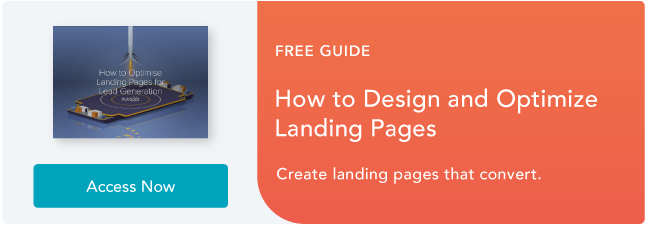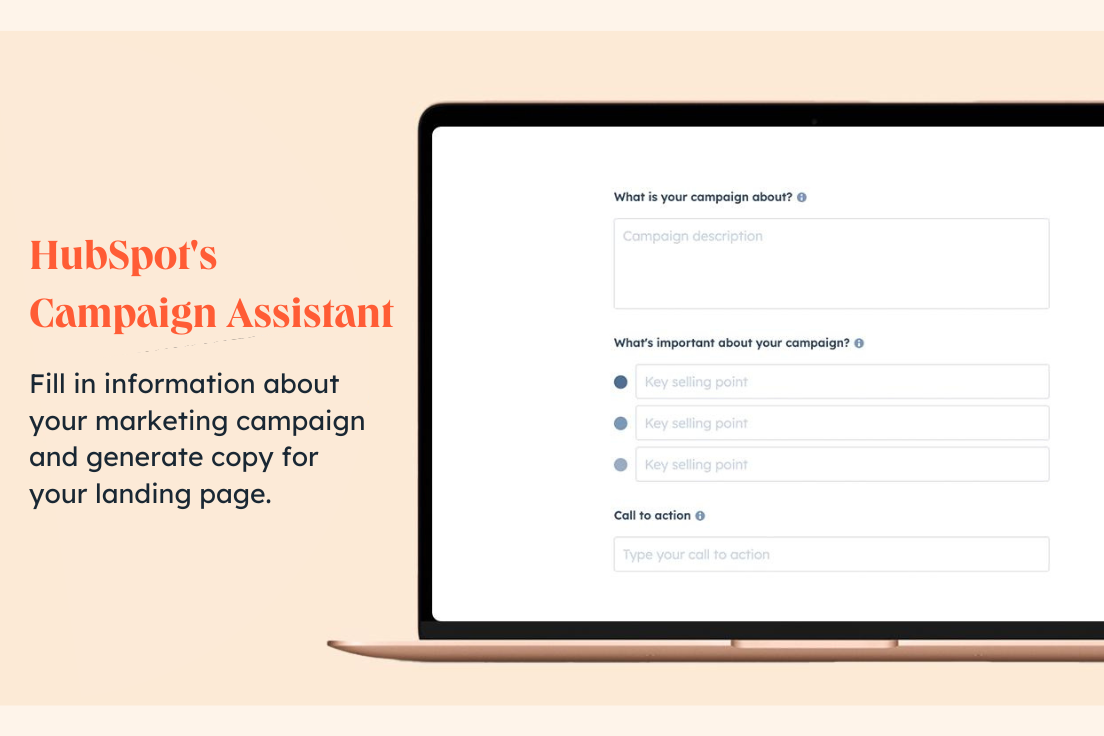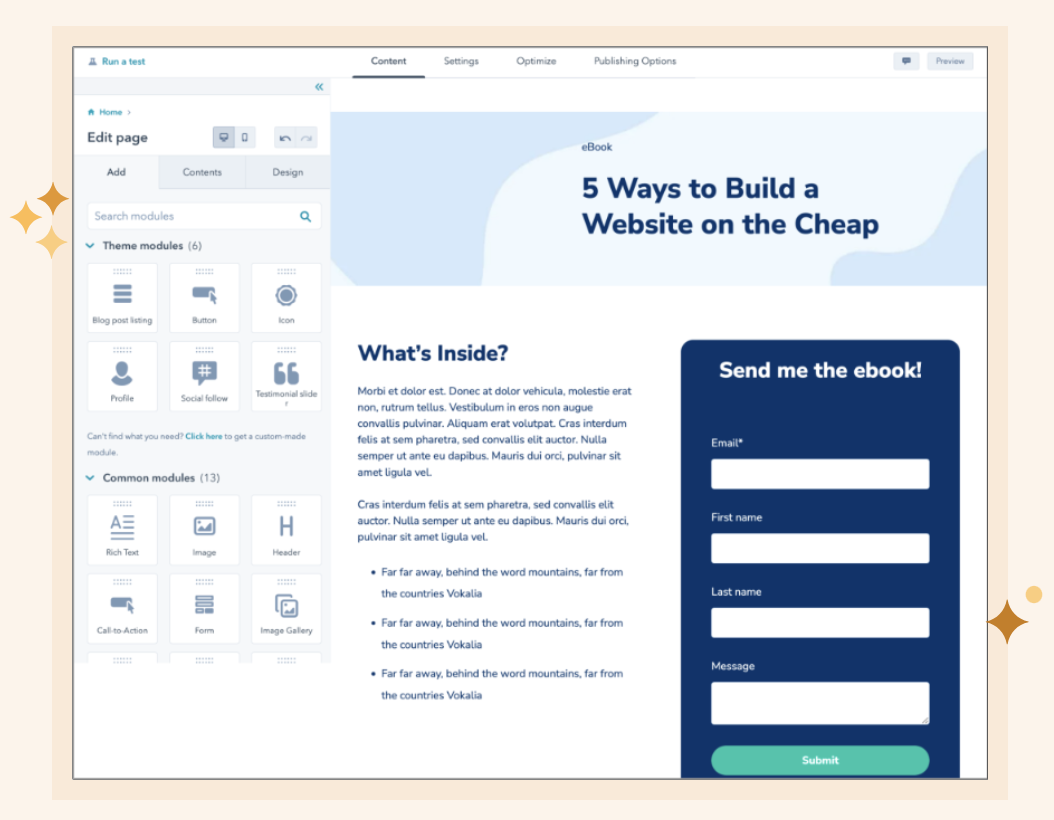“I’ve already got some landing pages, so why should you make more?” That sounds almost as crazy as saying the question, “Well I’ve already got some leads, why should I get more?”

Landing pages are an indispensable part of marketing. And for all you marketers out there who have been going inbound for a while, you understand how efficient they are at converting. But are you creating enough of them to really scale your lead generation efforts? Let‘s find out why — at least in the case of landing pages — more is better. And if you’re in a pinch, jump to the information you need:
Why You Need More Landing Pages
Landing pages convert by being focused and distraction-free, offering specific information about an offer. Limited navigation keeps visitors engaged and focused on the goal, avoiding distractions from multiple links.
To further prove that you should add more to your website, we surveyed 101 marketing and advertising professionals to learn which landing page elements and strategies were most effective.
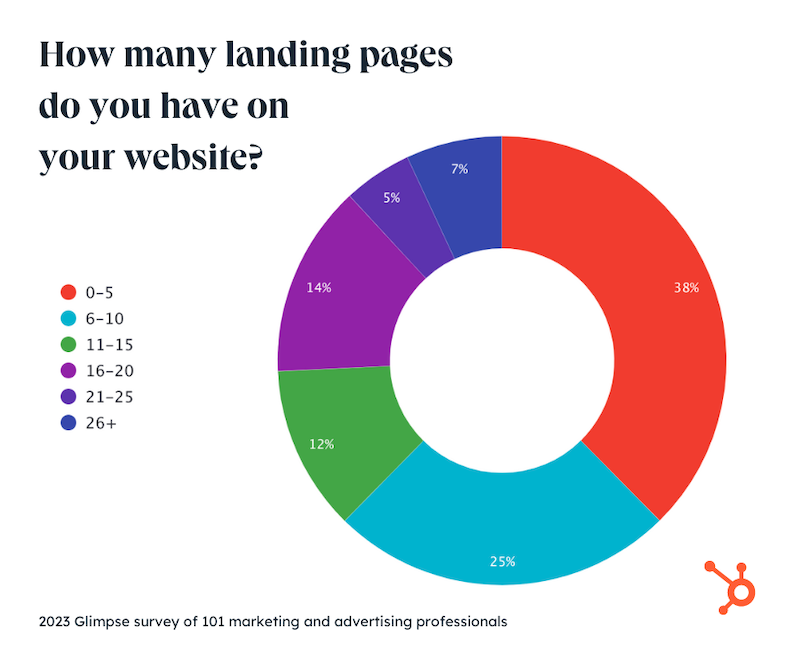
91% of our surveyed marketing and advertising professionals feel positive about conversion shifts after adding their landing page(s). And the top three reasons why they believe those conversions happened were because of their team:
- Marketing (17%)
- People (11%)
- Landing Page (9%)
Getting conversions means your marketing team is combining these three parts of their strategy to get results. And while there’s no exact figure we can tell you to make, there is enough evidence to back up why you should have more landing pages.
How many landing pages should I have?
According to research, business websites with 10-15 landing pages tend to increase conversions by 55% over business websites with less than 10 landing pages.
But it’s no exact science how many landing pages your business has, that is often reliant on the scale, product, or service of a business to determine. But after assessing survey and Marketing report data, we can conclude that multiple landing pages can be a net benefit for your business.
And don‘t think that there’s a ceiling to the number of landing pages you can include, in fact, those with more than 40 landing pages increase conversions by over 500%.
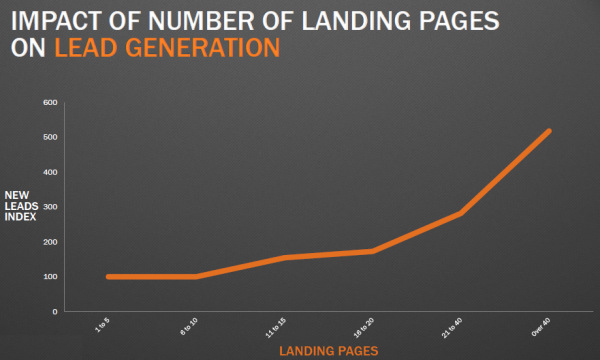
While most companies don’t see anincrease in leads when increasing their total number of landing pages from 1-5 to 6-10, companies do see a 55% increase in leads when increasing their number of landing pages from 10 to 15. And look how that leads index number spikes even more when a company has 40 or more landing pages on their website. And here’s how it breaks down for B2B and B2C businesses:
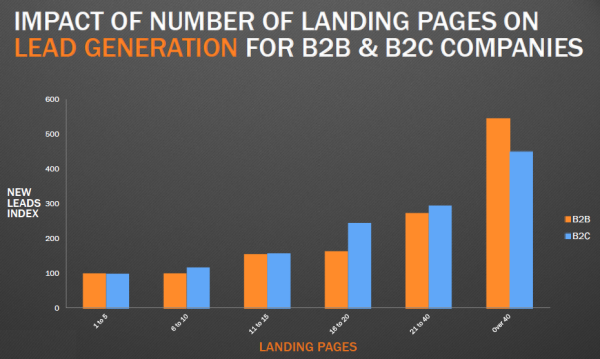
While both B2B and B2C companies seem to benefit from having more landing pages, it seems to be even more advantageous for B2Bs to hit that 40 landing page threshold.
As you can see, it‘s hard to deny there’s a pretty strong correlation between the number of landing pages you have on your website and lead generation. But why is this so? Here are four good explanations why the more landing pages, the better the number of your leads.
Why More Landing Pages Get More Leads
1. More landing pages mean more conversion opportunities.
Quite simply, the more landing pages you have on your website, the more opportunities you have to convert site visitors into leads. There’s also a hugeSEO benefit to having more landing pages, which can have an impact even before visitors land on your website.
Think about it: The more landing pages you have, the more landing pages will be indexed in search. And if a searcher stumbles upon a search result that directs them straight to one of your landing pages, you’ll have essentially cut out the extra step of a visitor perusing your site and needing to click on a call-to-action to get to that same landing page.
In other words, the pathway from discovery to conversion has much less friction. And do you knowwhat happens when there’s less friction? You generate more leads.
2. More landing pages mean more variety.
You’ve all heard that saying, “variety is the spice of life,” right? Yep — it applies to marketing, too.
Consider it from your visitors‘ perspective. Say you’re visiting a business‘ website, and you surf on over to its “Resources” section (you know, where a business might organize all its offers and their respective landing pages). Now let’s also say that “Resources” page only features 5 — or even 10, according to the research cited above — offers because, well, those are the only offers this particular business has available. And maybe none of those offers really appeal to you, because well … there’s just not enough variety. So you go on your web browsing way, abandoning the site without converting on anything.
The same thing will happen if that business only has CTAs for a few offers placed throughout your website or promoted via their other marketing channels. If none of them tickle your fancy as a visitor, you’re probably not going to convert.
In a nutshell, don‘t let this happen to you. Creating more landing pages means you’ll have a wider variety of offers for your visitors to convert on and for you to promote.
3. More landing pages means more marketing collateral.
The more landing pages you have, the more offers you’ll have to fuel the rest of your inbound marketing efforts.
Remember, content is the heart and soul of any successful inbound marketing strategy. Without it, you’d have nothing to email your contacts, nothing to share with your social media fans and followers, nothing to promote through your websitecalls-to-action, nothing by which to get found and rank for your keywords in search.
The more offers — and landing pages to house those offers — you have, the more inbound marketing you can do. And if you‘re wondering how to fill those pages with content fast, check out HubSpot’s campaign assistant.
Get started with HubSpot’s Free Campaign Assistant
4. More landing pages means more targeting opportunities.
Segmentation matters — and not just when it comes to email marketing. When youidentify various different buyer personas and segments within your audience, you have the opportunity to better appeal to those different audiences’ interests and needs with more targeted and relevant offers.
And to leverage this savvy thinking, face it: You need more landing pages. So what naturally ends up happening for marketers who build up a big arsenal of 40+ landing pages, is they start to create more segment–specific content that, because it’s highly relevant to different parts of their audience, is much better able to convert visitors into leads.
How to Add More Landing Pages
“I get it, I get it: More landing pages is better. But how can I go about cranking out more of those bad boys?” So glad you asked!
1. Invest in a landing page creation tool.
A big reason why businesses don‘t use landing pages is because their marketing department doesn’t know how to set them up, or they are too overloaded. And if you agree, you need to invest in a tool that enables you to quickly and easily create optimized landing pages.
This involves taking control of your website. Inbound marketing requires agility, and any agile marketer would take this first step to innovate and improve. Plus, I hear HubSpot has a pretty sweet and easy-to-useLanding Page tool.
2. Create more offers.
You can‘t just go around slapping together a ton of new landing pages, no matter how motivated you are to reap those “more is better” results. You’re going to need offers (andgood ones, at that) to go along with them.
Keep in mind that landing pages are simply the gateways for your marketing offers, so in order to increase your site’s number of landing pages, you need to increase offer creation, too.
Before you start creating new offers, take a look at the offers you already have, and identify where you might have some holes. Ask yourself these questions:
- Do you have offers to suit prospects at each different stage in your marketing and sales funnel?
- Do you have offers in a variety of different formats (e.g. webinars vs. ebooks vs. templates vs. videos, etc.)?
- Do they cover various different topics your target audience cares about?
Once you’ve identified what your holes are, then you can start filling in the gaps. To learn more about offer creation, check out thisblog post about how to create marketing offers that don’t fall flat.
3. Tweak the offers you already have to cater to individual personas.
Okay — so you‘re going to have to create a bunch more offers to leverage the lead-gen power of an increase in landing pages. But here’s a little saving grace: not all of these offers need to be created from scratch. In fact, if you already have a few general offers on your hands but also know that you have a few different buyer personas that you market to, one great way to increase your number of offers is to tweak your existing offers to cater to each of your different personas.
As you‘re doing this, reposition the content and create a landing page that caters to that persona’s individual needs, problems, and interests; adjust the offer’s formatting, depth, and length; modify language and tone; and incorporate industry/persona-specific examples.
And once you have a variety of persona-specific marketing offers, then you can segment your prospects by persona and nurture them with the right offers through tools like email marketing, ordynamic CTAs on your various web pages.
4. Repurpose content you already have.
While we‘re on the topic of tweaking existing content, don’t overlook the fact that there are a lot of different ways to create new offers using content you already have, saving you the time and effort of building a brand-new offer from the ground up.
More Landing Pages Can Benefit Your Brand
At the end of the day, you want to provide your customers more ways than one to find what they’re looking for. By having more offers and landing pages on your website, you provide more places for customers to land and engage with.
Editor’s note: This article was originally published in October 2012 and has since been updated for comprehensiveness.
